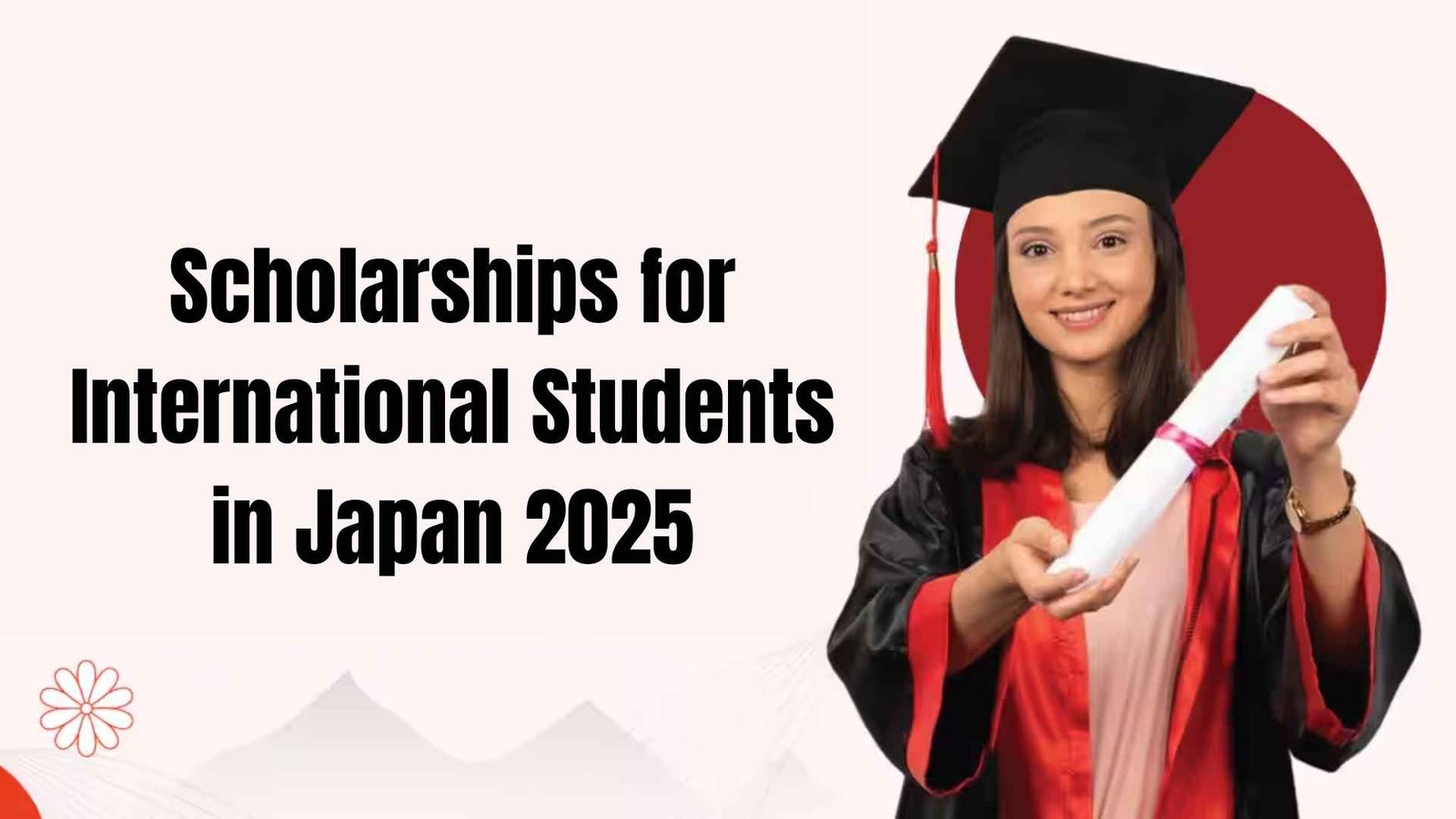Studying abroad is a dream for many students, and Japan has become a top destination for international learners due to its rich cultural heritage, advanced technology, and world-class education system. The country offers a wide range of programs in both English and Japanese at prestigious institutions such as the University of Tokyo, Kyoto University, Osaka University, and Waseda University, catering to diverse academic interests and career goals.
One of the key advantages of choosing Japan is the availability of scholarships for international students, which help significantly reduce tuition fees and living expenses, making higher education more affordable and accessible. These scholarships include government-funded programs like the MEXT (Ministry of Education, Culture, Sports, Science and Technology) Scholarship, which covers tuition, living costs, and airfare, as well as JASSO (Japan Student Services Organization) scholarships, providing monthly stipends and exchange program funding. Many universities also offer institution-specific scholarships, often based on academic merit, research potential, or leadership qualities, while several private foundations and organizations provide additional financial support for students in specific fields or research areas.
This comprehensive guide aims to help international students navigate the scholarship landscape in Japan for 2025, offering information on eligibility criteria, application procedures, and tips to strengthen your application. By thoroughly researching options, preparing accurate documents, and adhering to deadlines, students can maximize their chances of receiving financial support, enabling them to focus on their studies, engage in research, and enjoy a fulfilling academic and cultural experience in Japan.
Why Choose Japan for Higher Education?
Japan is home to some of the world’s most prestigious universities, including the University of Tokyo, Kyoto University, Osaka University, and Waseda University, recognized globally for their academic excellence and research achievements. These institutions offer a diverse range of programs in both English and Japanese, enabling students from various academic backgrounds and countries to pursue higher education without language barriers. Programs span multiple disciplines, including science, technology, engineering, business, humanities, and social sciences, catering to a wide array of interests and career goals. A hallmark of Japanese universities is their emphasis on research, innovation, and practical learning. Students have access to cutting-edge laboratories, advanced technology, and collaborative research opportunities, allowing them to participate in groundbreaking projects and real-world problem-solving. Additionally, these universities often provide support services for international students, including scholarships, counseling, orientation programs, and cultural activities, ensuring a smooth academic and social transition. Studying in Japan not only offers world-class education but also a rich cultural experience, preparing students for global careers and fostering personal and professional growth in a dynamic and innovative environment.
Beyond academics, Japan offers international students a rich and unique cultural experience that blends centuries-old traditions with cutting-edge modernity. Historic temples, serene gardens, and traditional tea houses coexist alongside bustling metropolitan areas like Tokyo, Osaka, and Kyoto, where skyscrapers, shopping districts, and entertainment hubs showcase Japan’s innovation and urban lifestyle. Students can immerse themselves in cultural practices such as festivals, calligraphy, martial arts, and seasonal events like cherry blossom viewing or winter illuminations, providing a holistic and memorable living experience.
In addition to cultural richness, Japan is recognized for its safety, cleanliness, and social discipline, making it a secure environment for students traveling alone or living independently. The country’s efficient public transportation system, including high-speed trains, subways, and buses, allows easy commuting between cities and campuses. Japan also maintains a high standard of living, with reliable healthcare, excellent infrastructure, and well-maintained facilities for education and recreation. These factors combine to create an ideal environment for international students, offering both academic rigor and lifestyle comfort. Studying in Japan not only equips students with world-class education but also allows them to experience a safe, modern, and culturally immersive environment, fostering personal growth, independence, and global awareness.

Scholarships for International Students in Japan 2025
Discover top scholarships for international students in Japan 2025, including MEXT, JASSO, university-specific, and private scholarships. Learn eligibility, benefits, and application tips to fund your Japanese higher education journey. Click now
1. Japanese Government (MEXT) Scholarships
The Ministry of Education, Culture, Sports, Science, and Technology (MEXT) in Japan provides a range of scholarships for international students, supporting studies at undergraduate, postgraduate, research, vocational, and Japanese language programs. These scholarships are fully or partially funded and are designed to reduce financial burdens, allowing students to focus on their academic and research pursuits. Typically, MEXT scholarships cover tuition fees, a monthly living stipend, and round-trip airfare to and from Japan. Eligibility criteria vary depending on the program, but applicants are generally expected to demonstrate strong academic performance, leadership potential, and motivation for study or research in Japan. By offering financial support and guidance, MEXT enables talented international students to gain access to world-class education, cutting-edge research facilities, and cultural experiences, making Japan a highly attractive destination for higher education and professional development.
- Research Students: For students pursuing master’s or doctoral degrees.
- Undergraduate Students: For students aiming to complete a bachelor’s degree.
- College of Technology Students: For students in specialized technical training.
- Japanese Studies Students: For students focusing on Japanese language and culture.
- Specialized Training for College Students: Vocational Education.
- Young Leaders Program (YLP): For future leaders in various fields.
MEXT scholarships typically cover tuition, airfare, and a monthly stipend.
2. JASSO Scholarships
The Japan Student Services Organization (JASSO) plays a vital role in supporting international students in Japan by offering a variety of financial aid programs. Among the most popular initiatives is the Monbukagakusho Honors Scholarship for Privately-Financed International Students, which provides a monthly stipend to help cover living expenses, allowing students to focus on their studies without financial stress. Another key program is the Student Exchange Support Program, designed to assist students participating in short-term exchange or study-abroad programs, covering part of their living and travel costs.
JASSO scholarships are highly valued because they reduce financial burdens, enabling students to participate fully in academic activities, research projects, and cultural experiences. These programs are open to students across undergraduate, postgraduate, and research levels, making them accessible to a wide range of international learners. In addition to financial support, JASSO often provides guidance on housing, student life, and integration into Japanese society, helping recipients adapt smoothly to their new environment. By combining monetary assistance with practical support, JASSO ensures that international students can enjoy a rewarding educational experience in Japan while minimizing financial and logistical challenges.

- Monbukagakusho Honors Scholarship for Privately-Financed International Students: Offers a monthly stipend to self-financed students.
- Student Exchange Support Program: Supports students participating in exchange programs between Japanese and foreign institutions.
These scholarships aim to create a financially stable environment for international students.
3. University-Specific Scholarships
The University of Tokyo provides a wide range of scholarship opportunities for international students, designed to support academic excellence and reduce financial barriers. These scholarships are offered either directly by the university or through external organizations and foundations. Programs cover undergraduate, postgraduate, and research students, with many scholarships including full or partial tuition coverage, monthly stipends, and sometimes additional allowances for living expenses. Some scholarships are merit-based, recognizing outstanding academic performance, leadership qualities, and research potential, while others are need-based or targeted at specific fields of study. Additionally, students can apply for short-term exchange or joint research scholarships, which facilitate international collaboration and cultural exchange. By providing financial support and access to resources, the University of Tokyo enables international students to focus fully on their studies, research, and professional development in a globally recognized academic environment.
Kyoto University: Provides financial assistance to international students, with amounts varying based on programs.
Waseda University: Offers multiple scholarship categories for international students, ensuring broad access to financial support.
4. Private Scholarships
Several private organizations and foundations in Japan offer scholarships to international students, supporting those pursuing undergraduate, master’s, or doctoral programs. Notable examples include the Honjo International Scholarship Foundation and the Nitori International Scholarship Foundation, which provide financial assistance to cover tuition and living expenses, enabling students to focus on their studies and research.
- Honjo International Scholarship Foundation: Supports students pursuing master’s or doctoral degrees.
- Nitori International Scholarship Foundation: Provides financial assistance to international students in Japan.
Application Process
The scholarship application process in Japan varies depending on the program and the sponsoring organization, but it generally follows several essential steps that applicants should carefully follow to increase their chances of success. The first step is to research and identify eligible scholarships that align with your academic level, field of study, and career goals. Popular options include MEXT scholarships, JASSO grants, university-specific awards, and private foundation scholarships. Once suitable scholarships are identified, the next step is to prepare all required documents meticulously. These typically include academic transcripts, recommendation letters, proof of language proficiency (Japanese or English), personal statements, and research proposals for research-based programs. Accuracy and completeness are critical to avoid delays or rejection. After preparing the documents, submit your application according to the specific guidelines of each scholarship, whether through a Japanese embassy, consulate, or directly to the university. Some scholarships may require interviews, written assessments, or additional documentation, so applicants should be prepared to demonstrate their academic achievements, research potential, and motivation clearly.
Finally, await the selection results. If selected, carefully follow any further instructions regarding visa processing, enrollment, and travel arrangements. By following a structured and thorough approach, international students can maximize their chances of securing financial support to pursue higher education in Japan.University-Specific Scholarships in Japan

- Research: Identify scholarships for which you are eligible.
- Prepare Documents: Commonly required documents include academic transcripts, recommendation letters, proof of language proficiency, and a research proposal (for research students).
- Submit Application: Follow the specific guidelines of the scholarship provider.
- Interview/Selection: Some scholarships may require an interview or additional selection process.
- Notification: Await the results and follow further instructions.
Meeting deadlines and submitting accurate information significantly improves your chances of success.
Frequently Asked Questions (FAQs)
1. What is the MEXT Scholarship?
The MEXT (Ministry of Education, Culture, Sports, Science and Technology) Scholarship is one of the most prestigious fully funded programs offered by the Japanese government for international students. It is designed to support students pursuing undergraduate, postgraduate, or research programs at Japanese universities. The scholarship covers full tuition fees, airfare to and from Japan, and a generous monthly living stipend, which allows students to focus on their academic and research goals without worrying about financial constraints. Additionally, some MEXT programs may provide allowances for settling in Japan, insurance, and research-related expenses. By securing a MEXT scholarship, students also gain recognition and access to a strong international network of scholars and professionals.
2. How can I apply for the MEXT Scholarship?
Applications for the MEXT Scholarship can be submitted through Japanese embassies or consulates in your home country (the embassy recommendation route) or directly through Japanese universities (university recommendation route). Each application route has specific eligibility requirements, deadlines, and documentation, so careful planning is essential. For embassy recommendations, students typically submit applications a year in advance, while university applications may have varying timelines depending on the institution and program. Preparing a strong academic profile, a clear study plan, and accurate documentation increases the chances of selection.
3. Are there scholarships for undergraduate students in Japan?
Yes. In addition to MEXT, many universities and private foundations offer scholarships for undergraduate students. These programs generally cover tuition fees, accommodation, and sometimes living expenses, aiming to support academically strong candidates who demonstrate leadership potential or specific talents. Some scholarships are merit-based, awarded for academic excellence, while others are need-based, designed to assist students with financial challenges. Applicants should check university websites and scholarship portals for detailed eligibility criteria and application guidelines.
4. Do I need to know Japanese to apply for scholarships?
Japanese proficiency is not always required, especially for scholarships linked to English-taught programs. Many universities in Japan offer courses and degree programs entirely in English, allowing international students to apply without prior knowledge of the language. However, having basic Japanese skills is advantageous for daily life, cultural integration, and part-time work opportunities. Some scholarships may also prefer or require Japanese language skills, particularly for programs taught in Japanese or research roles involving local institutions.
5. Can I work while studying in Japan on a scholarship?
Yes. International students on a valid student visa can work part-time, subject to immigration regulations and work-hour limits. Typically, students can work up to 28 hours per week during semesters and up to 40 hours per week during vacations. Part-time work helps students supplement their living expenses, gain practical experience, and interact with Japanese society, which enhances language skills and professional development. However, it is important to maintain academic performance, as scholarship conditions may require satisfactory study progress.
6. Are there scholarships for postgraduate students in Japan?
Absolutely. A variety of scholarships are available for master’s and doctoral students, including MEXT, university-specific programs, and private foundation grants. These scholarships often cover tuition, research costs, and living expenses, with some offering additional support for travel, conferences, and publications. Postgraduate scholarships often emphasize research potential, academic achievements, and career goals, so applicants should prepare detailed research proposals, study plans, and recommendation letters to improve their chances.
7. How competitive are scholarships in Japan?
Scholarships in Japan are highly competitive, attracting students from all over the world. Selection is based on a combination of academic excellence, research potential, leadership qualities, and personal statements. Students with a strong academic track record, clear career objectives, and a well-prepared application—including accurate documentation and compelling essays—have a higher chance of being awarded scholarships. Early preparation and understanding each program’s criteria are crucial to success.
8. Can I apply for multiple scholarships?
Yes. Students may apply for multiple scholarships as long as they meet the eligibility requirements for each program. Applying to several scholarships increases the likelihood of securing funding. However, applicants should carefully track deadlines, submission requirements, and overlapping conditions, as some scholarships may have restrictions on holding multiple awards simultaneously.
9. What documents are typically required for applications?
Commonly requested documents include academic transcripts, recommendation letters, proof of language proficiency (Japanese or English), research proposals for research-based programs, personal statements, and CVs. Some scholarships may require additional forms, such as health certificates or financial statements. Ensuring that all documents are accurate, complete, and professionally presented is essential, as incomplete or incorrect applications may be rejected.
10. When should I start applying for scholarships in Japan?
It is recommended to begin the application process at least one year before your intended study period. Early preparation allows time to gather necessary documents, take language proficiency tests, write research proposals, and meet embassy or university deadlines. Starting early also gives students the opportunity to seek guidance, refine their applications, and increase their chances of success in securing competitive scholarships.
Conclusion
Japan provides a diverse array of scholarship opportunities for international students in 2025, making it an attractive destination for higher education. These scholarships are designed to support students at all levels, including undergraduate, postgraduate, and research programs, helping to alleviate financial burdens and allowing students to focus fully on their academic and cultural experiences. Major scholarship programs include the MEXT (Japanese Government Scholarship), which is fully funded and covers tuition, living expenses, and travel costs, as well as the Japan Student Services Organization (JASSO) scholarships, offering monthly stipends and support for exchange students. Many universities also offer institution-specific scholarships, often based on academic merit, research potential, or leadership qualities. Additionally, several private foundations provide scholarships targeting specific fields of study or research excellence.
To successfully secure a scholarship, students must engage in thorough research to identify programs that match their academic background, field of study, and career goals. Preparing a strong application is crucial and typically involves submitting academic transcripts, recommendation letters, language proficiency certificates, personal statements, and research proposals for research-based programs. Adhering to deadlines and following specific application instructions—whether through embassies, consulates, or universities—is equally important. By carefully planning and executing each step of the application process, international students can significantly improve their chances of receiving financial support, reducing the cost of education in Japan. Securing a scholarship not only makes higher education more affordable but also opens doors to valuable academic, cultural, and professional experiences in one of the world’s most innovative and welcoming countries.Government Scholarships for Studying in Japan
If you wish to learn Japanese to improve your scholarship opportunities, consider enrolling at The Japanese Language School. For more information, contact us at +91 8700956038.


COMMENTS